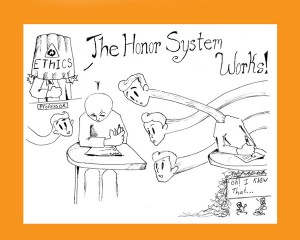According to a Gothic Times campus survey, 83 percent of students admitted to cheating on a college exam.
“No, [I’m] not surprised. It’s a rampant situation at universities everywhere,” said Dr. Barbara Feldman, Dean of the College of Arts and Sciences.
The survey was taken by 100 students –50 male and 50 female. Male students had a 84 percent cheating rate, while females were slightly lower at 82 percent. The survey question did not specify how often and in what manner students cheated.
Education Portal, a higher education informational website, reported that the percentage of students who cheat at any given university ranges from 75 to 98 percent.
Students on campus considered the number high but weren’t surprised according to a group discussions about the matter.
“If they’re cheating, then that’s going to hurt them in the future,” said Joe Bulatowicz, 20, a biology major from Bayonne who never cheated.
Students, who asked to be anonymous, shared some of the ways they have cheated on exams.
Sign language is a popular way of cheating during math exams. Students said that, while sitting in rows, they would exchange answers using signs such as a cough or tapping the pen on the desk as a way to signal an answer on a multiple choice exam.
One student took a picture of a math exam and emailed it to his friends who text him back with the answers.
Another student admitted to cheating during a computer science exam on binary numbers by pretending to be using the calculator on his phone when in fact he was googling the answers.
Many students said some professors who aren’t strict are blatantly allowing students to cheat right in front of them. Students learn of these professors through word of mouth and take those classes.
“He made it too easy,” said a student who asked to stay anonymous, “we got the exact questions to the test. He walked out the room, I took a blue book and wrote everything that was going to be on the test. During the test I switched them.”
Asked if professors are doing a good job observing students during exams, Irene Tanchez,18, biology major from Bayonne said, “There’s a few good hawks out there, but for the most part no.”
Tanchez said she never cheated on a university exam.
“Professors should do everything they can to prevent it [cheating],” said Dr. Feldman who believes that students should be more ethically responsible and considerate of the consequences.
“We take it seriously, and there are serious consequences,” said Dr. Feldman.
According to the NJCU Academic Integrity Policy, a student caught cheating may be given an F in the class, be placed on probation, suspension, or expulsion for one or more semesters with a notation of “disciplinary suspension” indicated on the student’s record. The student may also be permanently thrown out of the university depending on the severity of the case.
Students who admitted cheating said that their grades would be fine even if they didn’t cheat. According to these students, cheating is a reaction to frustration, anxiety, and stress before an exam.














